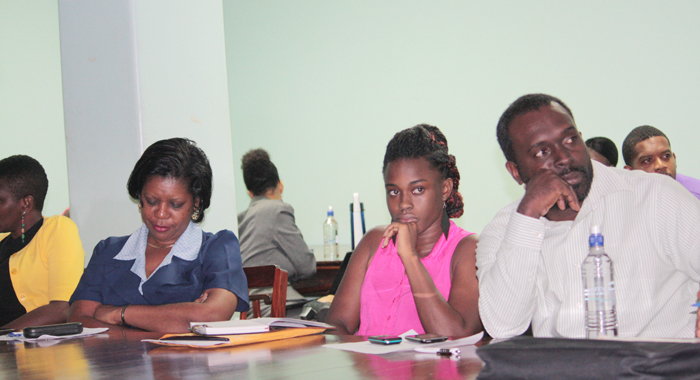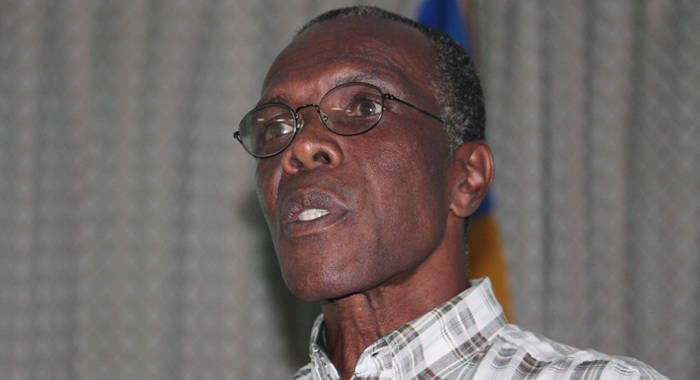A local environmental scientist has called for land degradation to be made a priority issue here.
Dr. Reynold Murray last week decried the absence of “national champions” of land degradation issues both at the community and ministerial levels.
“You know what is strange … is that you spend a lot of money addressing land degradation issues …, but you just haven’t brought the pieces together,” he said on Thursday during a two-day United Nations Convention to Combat Desertification (UNCCD) National Action Programme workshop at the Ministry of Foreign Affairs Conference Room
“You have extension officers, you have a Forestry Department that is doing trails, etc. They have the resources. What you need to do is to put the pieces together so that it becomes functional,” Murray said.
“The Ministry of Agriculture, Industry, Forestry, Fisheries and Rural Transformation needs to make LD a priority issue,” Murray said

On the subject of agriculture and export, Murray said that decreased export of agricultural produce doesn’t mean there is less agriculture in the country.
“You go through this country and you will be surprised at how many persons are really dependent on the land for a living. And those person who are dependent on the land, very often don’t have any land,” he said.
He told participants that the flooding of Georgetown in April 2011 is not as strange as it seems.
The disaster, according to Murray’s explanation, was also not all natural.
Heavy rains in the heart of the dry season that year resulted in the flooding of the town on St. Vincent’s north-eastern coast.
Making a presentation on the “Status of Land Degradation in St. Vincent and the Grenadines”, Murray said it is important that persons understand the nation’s soil types.
“… that flood that they had, it looks so complex to people ,but it is not a complex flood. It is very simple,” Murray said.
He explained that to the back of Georgetown where bananas were cultivated, the soil is very loose.
“… you can pretty much pick up the soil and run it through your hands like that.
“Now there are no bananas up there, the drains, large drains, that they had maintaining during the banana production period and the feeder roads, are no longer open. They are filled with sand. So, when the rain came, where was the water going to flow?” he said.
Murray said that in the absence of drains, the loose soil was easily transported and resulted in the flooding of the town.
“So, it is a matter of soil type that is part of the problem in terms of our erosion and the loss of fertility in St. Vincent and the Grenadines. So, we have to work assiduously to maintain the fertility of the soil, to keep the vegetation cover in order to prevent erosion,” he said.
“Soil degradation is mainly a factor of our misbehaviour in this country. So, you need to be aware of that…” Murray said.
He said poverty has been identified as one of the major cause of land degradation in SVG.
“The increased unemployment associated with loss of preferential treatment in the Banana Industry has lead to reduction in foreign exchange and a shift towards less productive and sustainable utilization of the land, such as charcoal burning and shifting agriculture.”
Murray said that poverty also contributes to land degradation in the sense that persons who had little or no means try to exist on marginal lands.
Among the other contributor to land degradation, Murray mentioned poor agriculture practices, including removal of contour barriers, mono-cropping, down hill tilling on steep slopes, and abuse of chemicals.
Other contributing factors include weak and unenforced policies, absence of land zoning plans and policies, climate change — floods, drought, coastal erosion, and
sand mining.







I am fully in accord with Dr. Murray’s views above. For several years, I have been warning and cautioning one and all on the likely consequences of these fool-hardly practices or lack of once commonly understood agricultural methods and techniques. We are even worse off, in these respects, than we really care to acknowledge. Let us have an about-face, NOW, or see our people suffer economically, nutritionally, socially, and from actual widespread hunger, ever-wider poverty, diseases and starvation/famine.
The insights of Dr. Reynold Murray, and also recently, Dr. O’garro, ought to stimulate a national agricultural and agrarian re-awakening, resurgence, and true economic revolution, minus the political opportunism and false imported foreign mostly communistic ideologies.
Quo vadis, SVG? Whither goes thou? Ah wey we go do?
Our immediate and short-term CHOICES will determine our farming, gardening, agricultural, educational, financial, economic and ecological destiny as a people and as a 21st Century nation.
Let us choose, smartly, and work hard at it. Every nation Is the maker of its own destiny God willing. ‘Nuff respect to all and sundry. Make the wise decisions and urgently embark on the sensible, common-sense route as declared by Bro. Murray.